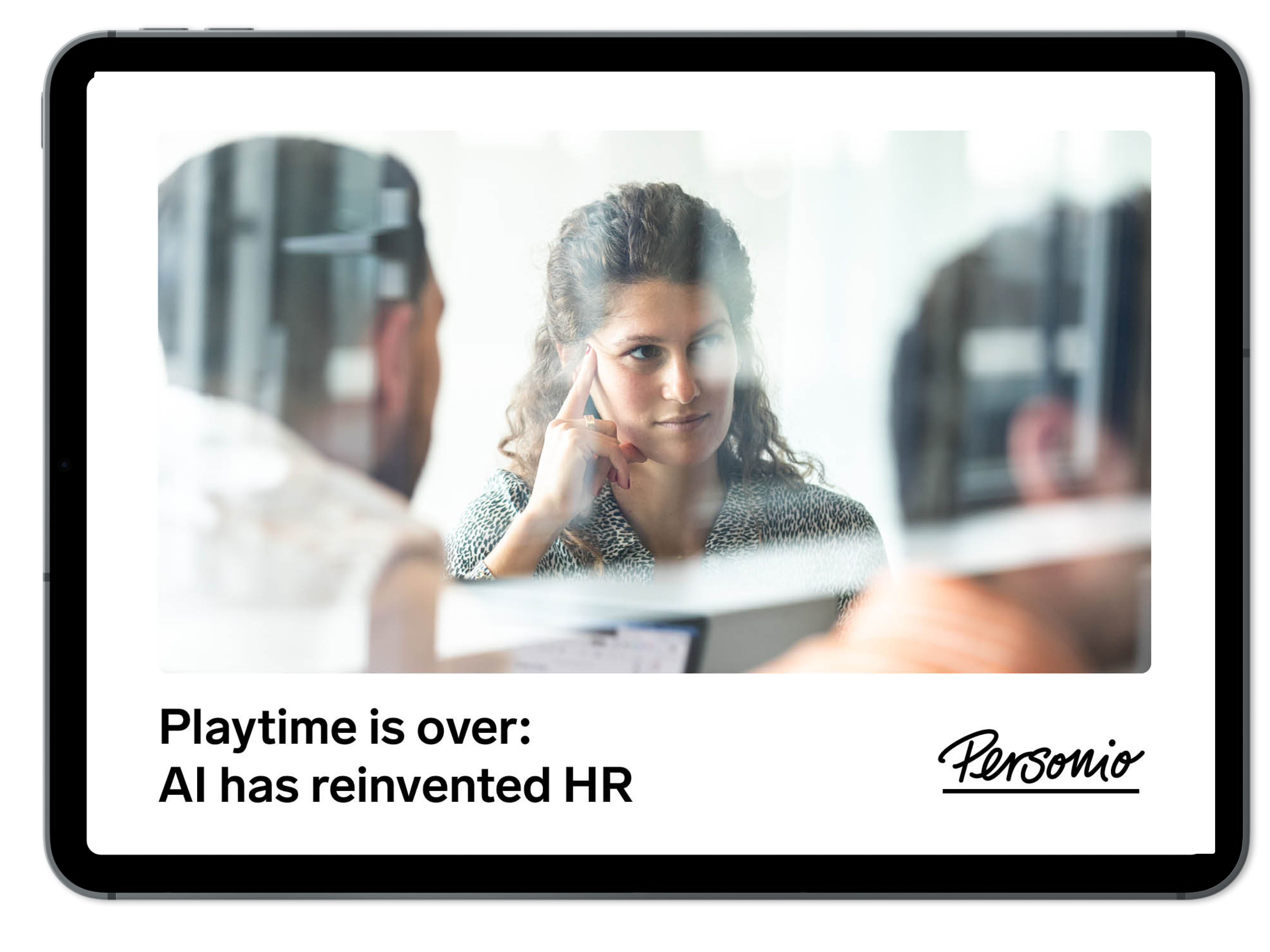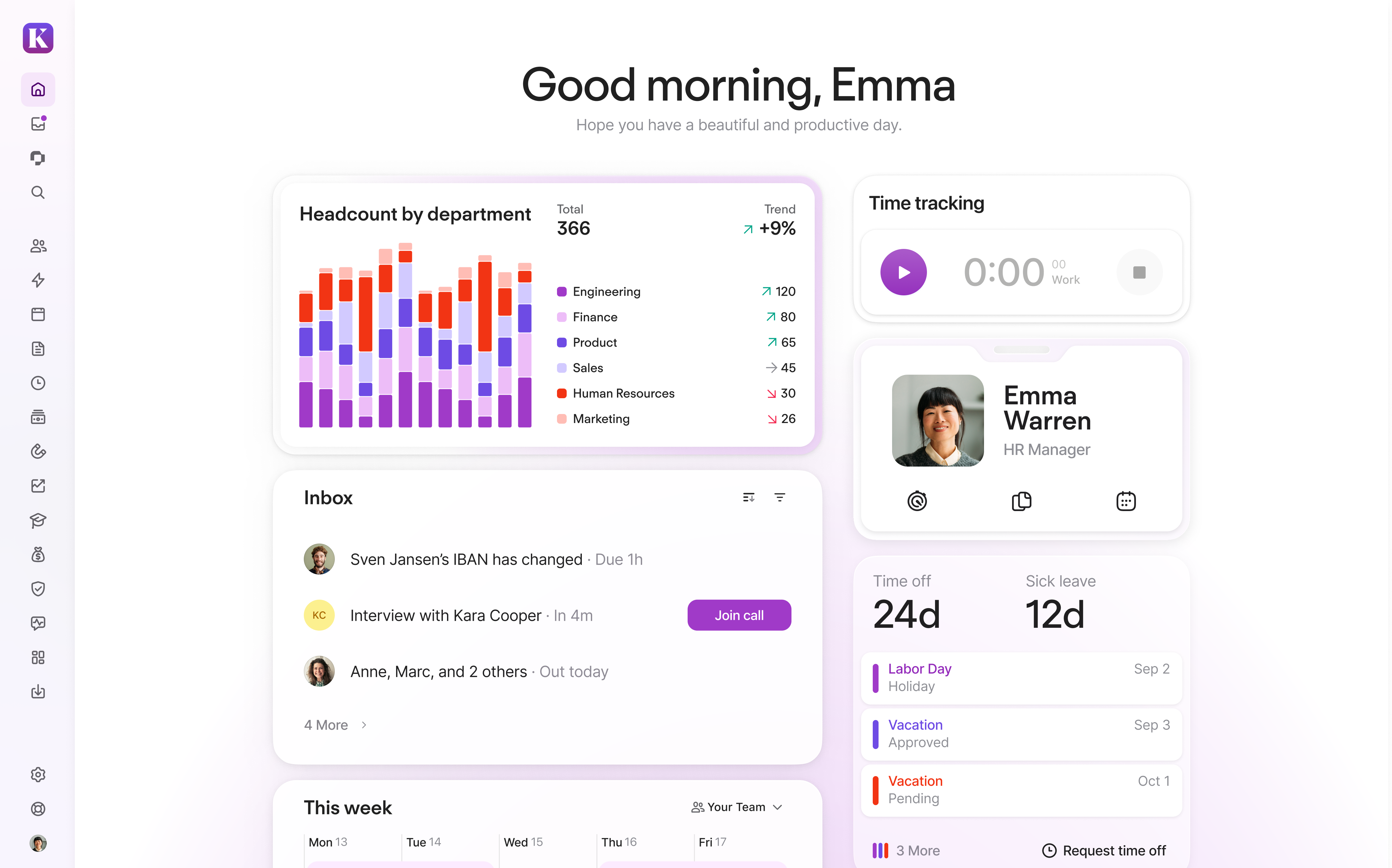The future of HR: How AI and analytics in HRMS are changing the game
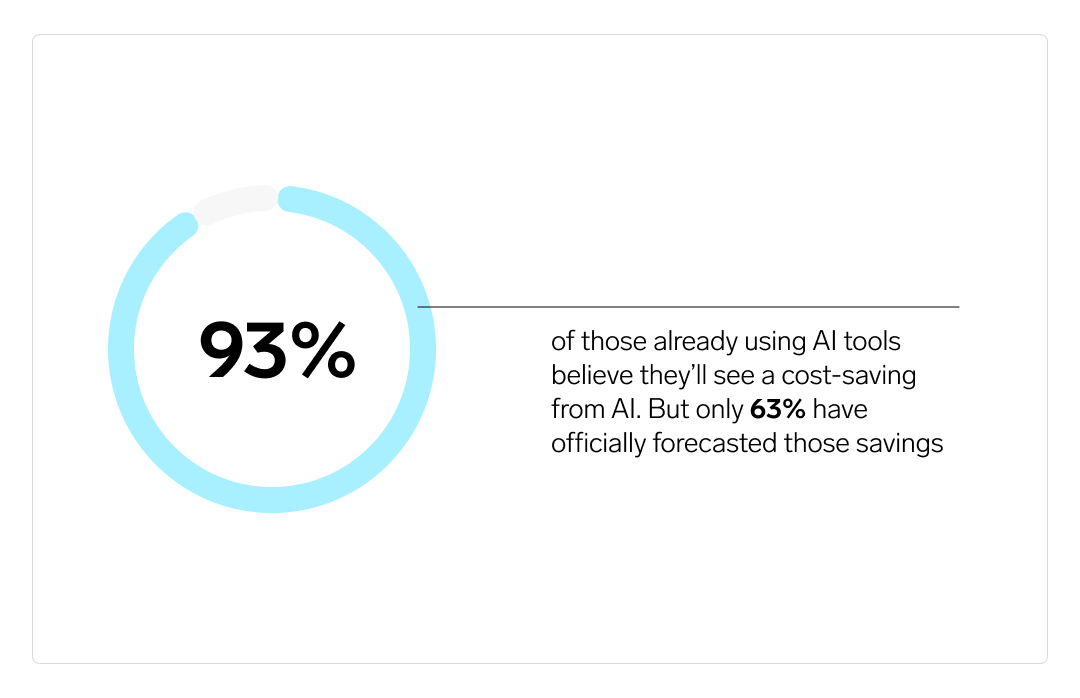
Human resource management systems (HRMS) are shifting from a support tool to a strategic asset thanks to evolving AI and automation capabilities. This technology allows HR teams to drive productivity in ways that weren’t possible before.
But AI’s impact goes beyond efficiency. Through advanced data analysis, it allows you to anticipate workforce needs and make more informed decisions for your business.
This article explores the impact of AI on HR management, looking at where AI tools have the most value, what results you can expect and how to make the most of these benefits.
How AI is transforming HR management
AI is rewriting HR’s job description. By handling administrative tasks, the technology gives your team more time for work that truly adds value; you can forget about filing and focus on more impactful tasks like workforce planning, team building and employee engagement.
“Managers spend around 50% of their time on administrative activities,” underlines Perry Timms, Founder of People and Transformational HR Ltd. With AI taking over those tasks, that time can now be allocated to “coaching their teams, building stronger relationships with other managers, strengthening their plays on planning, forecasting,” and other strategic work.
This freed-up time also has a dramatic impact on HR’s relationship with employees, as you have more capacity to prioritise cases that require empathy and genuine understanding. And the majority of workers are on board with AI in HR, as they appreciate chatbots' fast responses to inquiries.
Don’t HR managers usually stick to strategy anyway? In large organisations, at least, you leave the administration and employee support to your team.
AI doesn’t just reduce your team’s workload. Data analytics gives you more insights into your business performance and upcoming market trends. This lets you get proactive with your HR strategy and adapt more effectively to change.
While AI can play a supportive role, experts agree it can’t replace your HR department. Tom Cheesewright, Chairman of Pomona Partners, says, “A job is a complex collection of tasks. While AI can do some of your work, it cannot do your whole job – or anyone’s. Instead, you can use AI to do a lot of things better and stop doing some of the tasks you don’t enjoy.”
Dan Sodergren, Founder of The AI Marketing Course, agrees and says AI works best as a “second brain”. He adds, “Everyone now can have their own intern – one that knows almost everything and never gets tired.”
Download our whitepaper ‘Playtime is Over’ for more insights from HR experts on how AI is reinventing the sector.
Where do AI tools provide the most value to HR teams?
AI tools are everywhere, but the best ones for HR are purpose-built for your needs. Let’s look at the AI features that have the biggest impact on HR management.
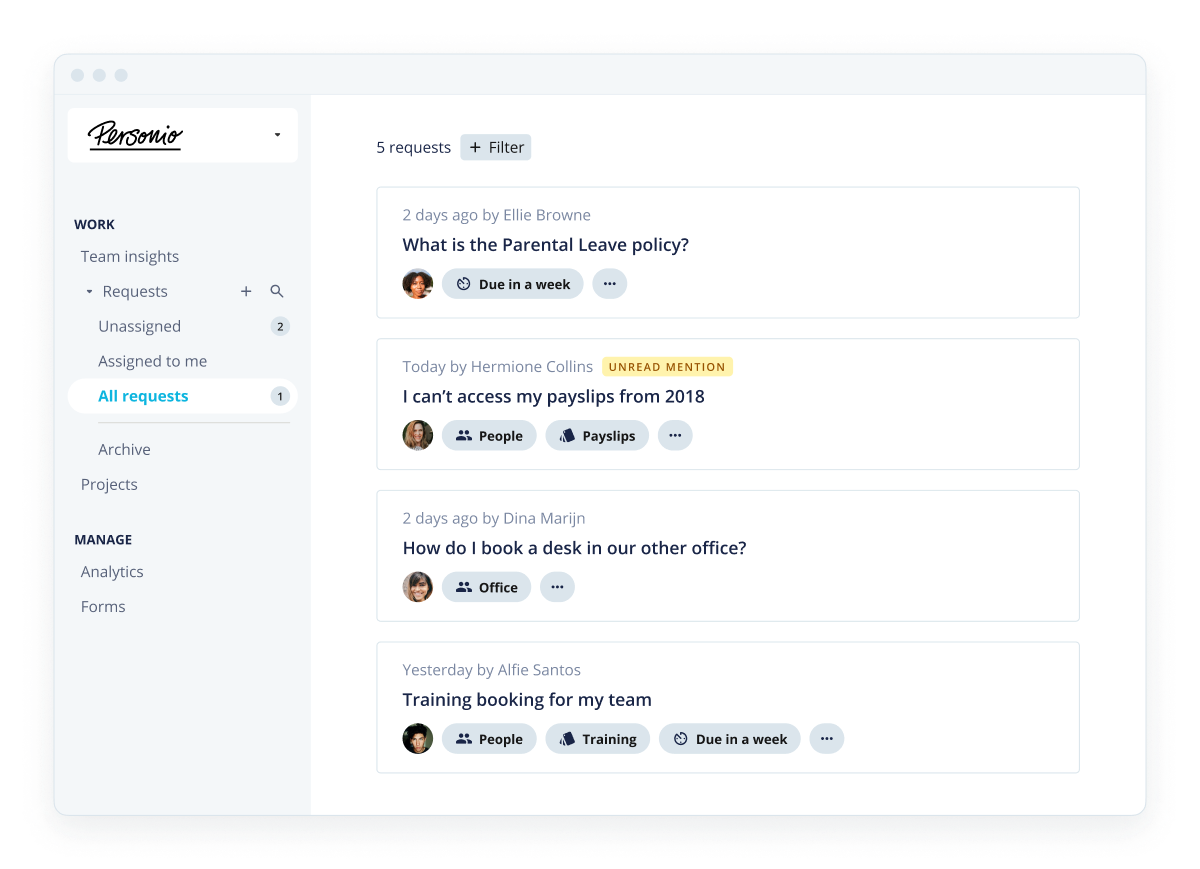
Recruitment
AI is a natural fit for talent acquisition, where repetitive tasks like writing and posting job listings often detract from high-stakes hiring decisions. You can leave interview scheduling and candidate screening to your talent management software so you can spend more time getting to know the people on your shortlist.
AI can also analyse all your applicant data to give you deeper insights into how fit potential candidates are for a given role. This helps you make strong hiring decisions that align with business objectives.
Onboarding and employee training
Onboarding calls for plenty of face time with new hires as you welcome them to your team. But these early days often get filled up with paperwork and training sessions.
AI in HRMS automates many of these processes, allowing you to focus on what really matters: orientation, guidance and integration into your company culture.
Take Personio’s AI chatbot, for example, which can handle all quick questions from new hires–meaning they don’t have to keep turning to HR for answers and giving them more autonomy from day one. Meanwhile, you have more time for meaningful interactions, like tackling unexpected issues or navigating team dynamics.
Ensure employees get answers to HR questions fast and get more time back in your day

Personio Conversations acts as your automated HR help desk–so you can engage employees without spending hours responding to messages.
Learn morePerformance and development
HR’s role in performance management and professional development has often been limited to that of coordinator. You manage logistics, schedule reviews and track course participation rather than driving meaningful employee growth.
AI elevates you to a more strategic advisory role. With tools to help you analyse individual performance, you can make personalised recommendations and offer tailored courses.
Some AI tools let you generate learning materials for specific roles. Personio’s integration with 360Learning, for example, helps you turn basic documents into multimedia lessons or entire courses.
Employee engagement
AI helps you take proactive measures to engage your team. By analysing workforce trends, it can suggest root causes of disengagement and turnover at your company, whether that’s limited development opportunities or a lack of mentorship. You can then step in early with the right approach for keeping motivation and retention levels high.
When you combine AI with employee surveys, you can get deep insights into what drives your people–and what causes them to disengage. Sentiment analysis can process hundreds, if not thousands, of comments to highlight areas that need your attention.
HR data analytics
HRMS has moved beyond merely collecting and organising data. Now that you can leverage AI analytics features, it’s easier to spot trends and patterns that impact business decisions, like workforce management and succession planning.
When you can predict labour needs or suggest how to raise productivity, you can contribute more to strategic initiatives. This gives your HR team access to insights that would otherwise have gone unnoticed.
Why AI is great news for HR teams
The ROI of implementing an HRM system with AI features is clear, with 93% of HR professionals already using AI tools stating they believe they’ll see cost savings from the technology. See how AI can benefit your HR team and your business.
Significant time savings
AI saves knowledge workers an average of one hour per day. And when it handles repetitive tasks like data entry or compliance checks, HR processes become much faster.
Better yet, when you delegate menial work to AI, you free up your time to pursue more creative, meaningful projects. Rather than burying yourself in absence management spreadsheets, for example, you can explore ways to boost employee satisfaction and team morale.
Lower operational costs
One hour saved a day doesn’t sound like much. But even if you only manage a modest team of 50 full-time staff, that amounts to over 100,000 hours a year–or the equivalent of six full-time jobs.
Think about what you can do with that extra capacity; you can manage your workload with a leaner team, saving money on labour, or you can build out your recruitment team and invest more of your hiring budget into sourcing top talent.
Fewer manual errors
AI capabilities mean you don’t have to worry about the quality or accuracy of your work. Task automation reduces the errors that result from manual data input, and the technology continuously learns from its experiences.
Recruitment is a good example: AI can process hundreds of applications and summarise the information without getting any details wrong in a fraction of the time it would take someone on your HR team to do so accurately.
More data-driven decisions
AI can analyse large datasets to uncover patterns, allowing HR teams to base strategies on evidence rather than intuition. There’s less risk that unconscious bias may influence your decisions, especially when it comes to hiring and promoting.
Although AI can guide your decisions, experts say you shouldn’t let it control the narrative. “AI is good at turning data into insights,” says Dr Tomas Chamorro-Premuzic, Chief Innovation Officer at ManpowerGroup. “But going from insights to action requires sound human judgement, experience and strategic thinking.”
How to train your team to make the most of AI
The majority of HR managers agree some training is necessary to reap the benefits of the technology and avoid its pitfalls. And that’s not limited to HR professionals; everyone on your team should learn how to use AI the right way.
Here are some tips for training employees on how to use AI in HRMS software.
Start with the essentials
Cover the basics to get everyone comfortable with AI, then build on this foundational knowledge. Specifically, look at:
The meaning of common terminology (e.g. algorithm, machine learning, natural language processing, prompt)
Popular types of AI solutions
The benefits and limitations of AI in HR
How AI can fit into each team’s workflow
How to interpret AI outputs
Which security practices to follow when using AI
Data privacy is a major concern with AI that often gets overlooked. Now that there are international regulations like the AI Act that govern the use of this technology, your team must follow certain rules or risk incurring a significant penalty.
For example, does everyone anonymise employee data they enter into AI systems? Some team members may not realise models like ChatGPT store the information users input and use it to generate other outputs.
Show everyone what they already know
Make AI less intimidating by connecting it to software and apps your team is already familiar with. Most AI tools aren’t entirely new, and they usually build on features your employees have probably encountered on your HRMS software or elsewhere.
Suppose you’re planning to introduce AI virtual assistants to answer employee inquiries. You could compare it to the chatbots on most online shops or customer service websites. Ask your team about their familiarity with these tools and how they’ve helped them so they can draw on previous experiences.
Focus on practical applications
Get employees excited about AI by showing them what they can achieve. You can give examples of how to use the tools or discuss what results departments have already seen. If AI is relatively new to your workplace, tell a success story about a well-known company.
For instance, Personio often publishes case studies about how customers implement our AI features. You can show these testimonials to team members to motivate them to adopt the technology themself.
"Thanks to Conversations, we were able to take our employee experience to a new level. Everyone knew the current status of their HR ticket; it makes for simple, effective and transparent communication."
– Anna-Lena Pusch, People Operations Manager at Getsafe
Encourage shared learning
For a successful AI rollout, develop an internal knowledge base full of articles and training materials about your AI tools. You can store it within your HR system so employees can access it at any time.
As teams integrate AI into their workflows, have them contribute to the knowledge base or update existing resources. For instance, your sales department might discover an effective new prompt for one of your tools. Just make sure an administrator approves any changes so everyone can trust the resources they’re using.
AI Chatbots like Personio’s can integrate with your knowledge base. When an employee asks a question, the chatbot pulls information from the system or links them to the relevant articles.
Create room for experimentation
Hands-on experience will help employees get more comfortable with AI technology, so set up sandbox environments for them to try out tools. All you really need to do is give employees access to the tools via your HRMS.
“Not all training needs to be formal from the start,” says Aisling MacNamara, Senior Manager of Learning & Development at LearnUpon. “Practising will help your team get comfortable using AI, and then you can start to layer in some more formal courses that level up its impact.”
This freedom lets teams discover AI’s potential on their own terms. When they can test and learn at their own pace, they’re more likely to get comfortable with tools and develop a habit of using them.
Level up HR management with Personio
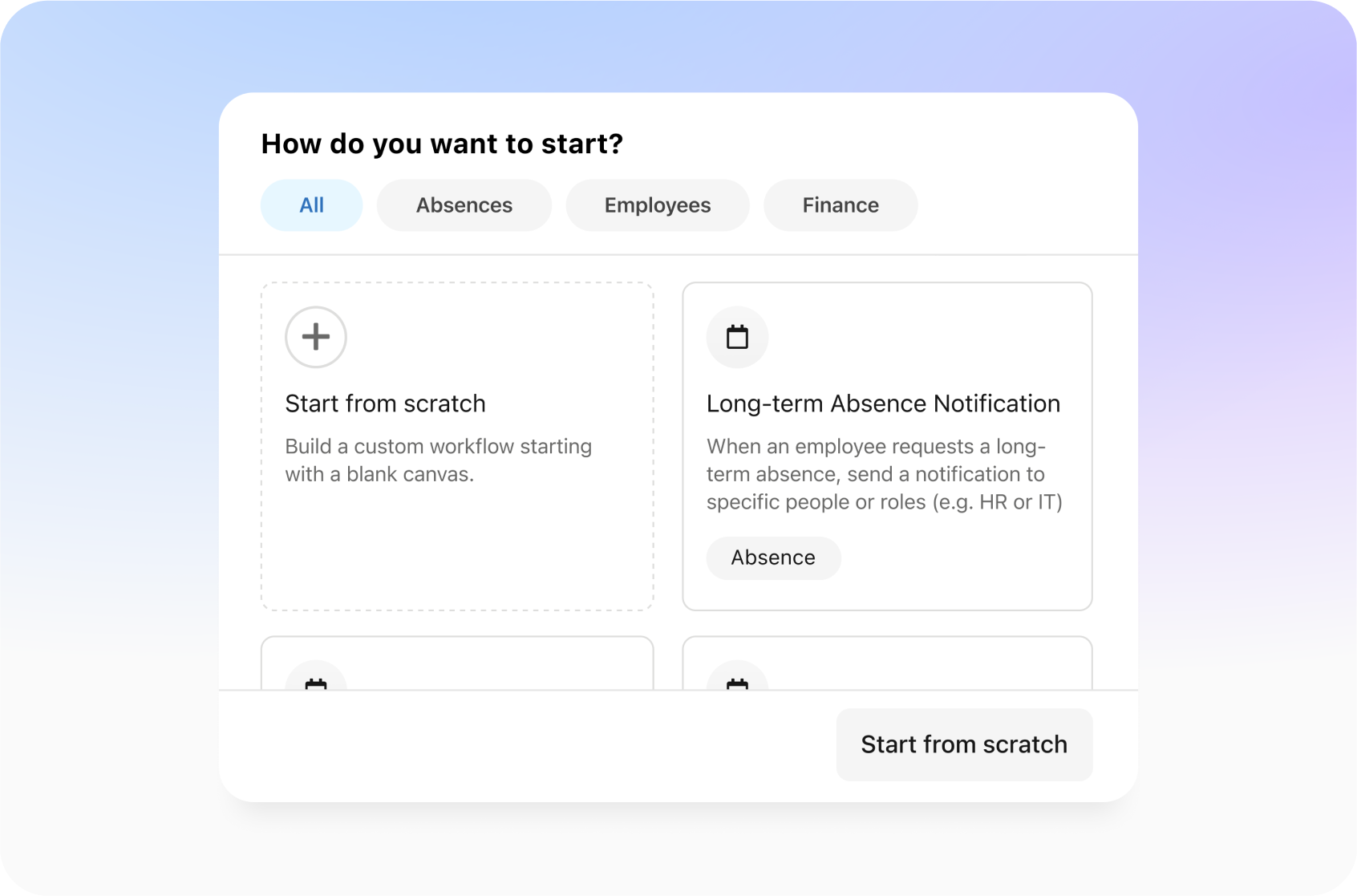
AI gives HR a bigger role in strategic decision-making. Because when AI handles all the small details, you’re free to focus on the big picture.
Personio gives you a strong starting point to integrate AI into your HR management processes. We offer powerful Workflow Automation to support AI-driven processes and connect all your operations.
And with AI-powered Conversations, you can reduce time spent on employee inquiries while making sure everyone feels supported. Plus, our analytics features collect all the data you need to transform numbers into actionable insights.
Start leveraging the power of AI with Personio’s all-in-one HRMS–and begin to notice the benefits for your organisation’s productivity, employee experience and bottom line.
Manage HR processes at scale with powerful automations
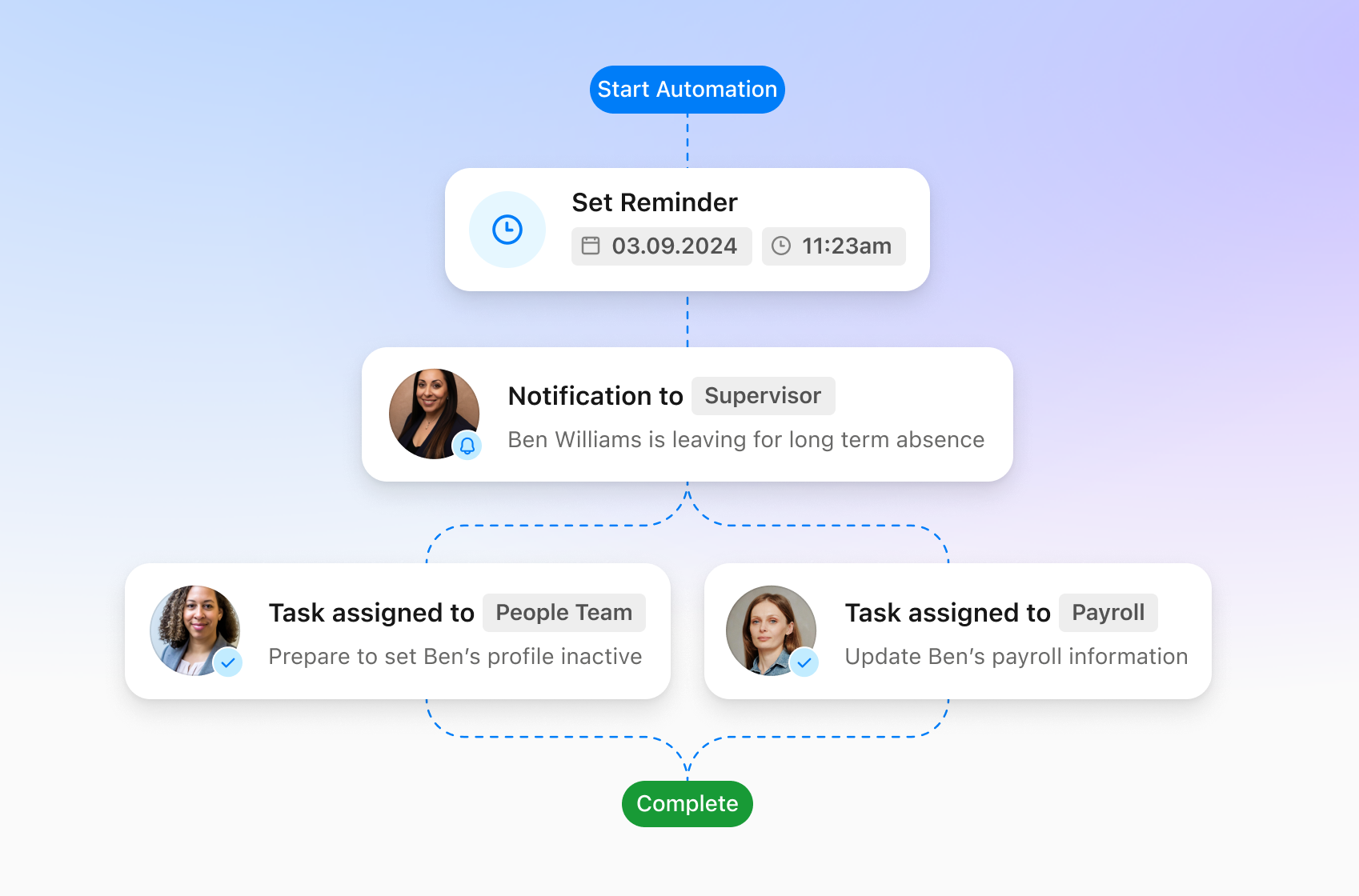
Personio’s advanced automation features reduce your administrative load and give you more time to focus on your business health and growth.
Learn more about Workflow Automation